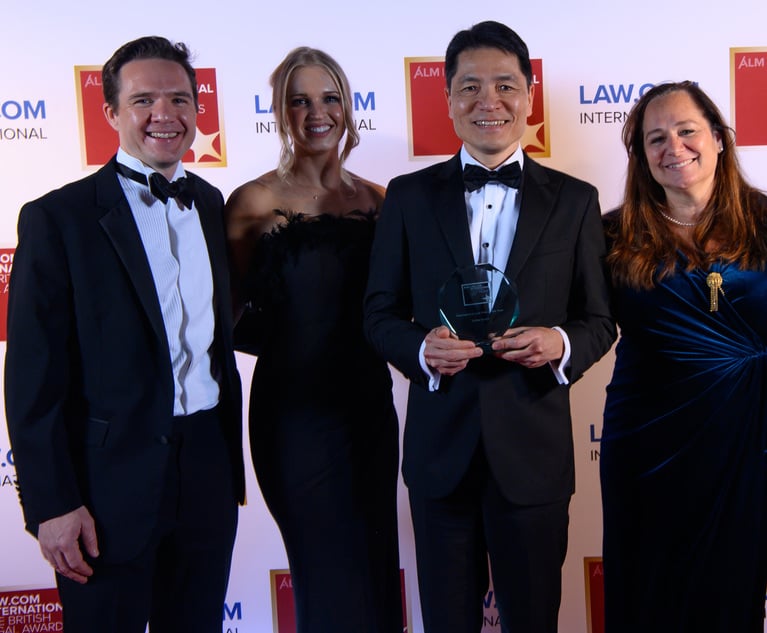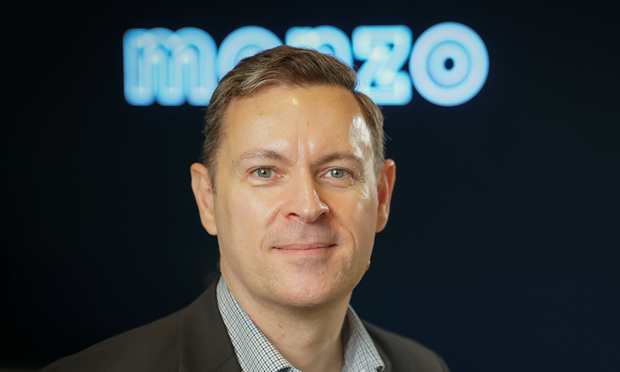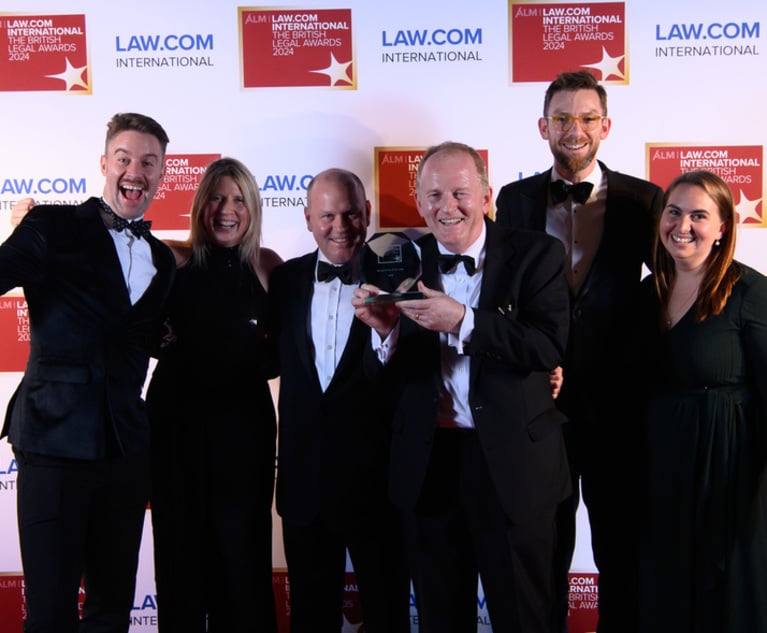"There's A Sense Of Dread Around Legal Tech" — Monzo's Legal Head On Managing Plethora Of Solutions
James Sullivan also discusses how the in-house role has evolved, noting it is no longer a "second rate career choice compared to private practice".
March 13, 2020 at 07:27 AM
5 minute read
With an endless choice of legal technology out there for in-house leaders to grapple with, head of legal at digital bank Monzo James Sullivan, proposes how general counsels can manage the abundance on tech solutions on offer and how to best "navigate through the noise" to identify the best solutions.
Speaking to Law.com International's Legal Week, Sullivan also discusses how his external legal advisers can best support the business against the backdrop of increasing tech, and some other key focuses for Monzo in the next year.
What are some of your key focuses for the next year?
This year we're redesigning our target operating model to ensure the team can continue to best partner with Monzo through its next stage of growth and maturity. Our mission is to support Monzo's growth, help build and maintain a strong and sustainable platform and protect Monzo from harm. This means acting as an independent guardian, trusted adviser and business partner.
Being part of a scale-up business has its unique challenges, trying to keep up with the pace of growth and at the same time building the team's operating model today for what Monzo will need from us in three-five years' time.
All too often I hear GCs talk about doing 'less with more' which is really code for spending less. When you're in scale-up mode that's really hard or impossible to achieve. At Monzo what we need to be able to demonstrate is that we're focusing on being efficient, looking for opportunities to create scalable solutions to common problems, implementing tooling and processes, and maximising the value we can extract from our external law firm relationships.
How is the in-house market changing? What challenges should in-house leaders be aware of?
A key area is how GCs should best position themselves to exploit technology solutions. There's going to be increasing pressure on in-house leaders in the early 2020s to access the multitude of legal tech and reg tech solutions and be able to deploy them effectively and seamlessly in their businesses. This is driving the emerging career of legal operations professionals, as GCs increasingly find themselves unable to devote enough time to legal operations, and even if they do have time, this is often completely out of their comfort zone.
One other area of change I see is how in-house teams are recutting their outsourcing model to include traditional law firms, as well as a range alternative legal service providers and short-term consultants. This can be a great way to extract more value from your external legal budget and outsource repetitive, low value work. At Monzo we really see the value in an agile legal team accessing legal specialists from across the entire legal value chain.
Do you think in-house lawyers should embrace tech or be wary of it? How can they make the right decisions given all the tech choices out there?
When I speak to GCs about legal tech there's frequently a sense of dread. GCs are confronted with an abundance of solutions to all kinds of legal problems, some they never knew they had. They often struggle to navigate through the noise to identify the best or most appropriate solutions that are going to be around in the longer-term.
My advice is to start with an agreed problem statement. If you don't have a common understanding of the problem you're trying to solve or improve upon, you'll likely struggle to find the right solution. There are a number of legal operations consultants in the market that can help with this, but they will never truly understand your business as well as you and your team – so make sure you work closely with your team to agree common ground.
Then try and experiment. Start small and solve some simpler problems first then use that experience to iterate and build – and don't forget to celebrate your successes along the way. At Monzo we've been trialling a workflow solution and an AI contract review tool. Our approach has been to start with a minimum viable proposition then use this learning to understand how we improve and build upon it.
How can your external legal advisers support you as you take on further tech and other challenges?
We view our external legal advisers as an extension of our own team and because of that we can sometimes be demanding and very specific about what we need from them. We've just been through a review process of the regulatory panel firms we work with and brought on board some additional firms to supplement some areas. So now we're working with some of the best specialist firms in this space and we're really excited about the advantages this affords us. We invest a lot in enabling our firms to learn about our business and they are ready to invest that time in us as well to make the relationship really strong.
It's important that your advisers operate in a way that best works for your business. For example, at Monzo we're not much interested in accessing a multitude of law firm tech platforms and apps and having our work product spread across different platforms – we need and expect our firms to operate in our environment. This enables us to be more efficient and execute quickly.
This content has been archived. It is available through our partners, LexisNexis® and Bloomberg Law.
To view this content, please continue to their sites.
Not a Lexis Subscriber?
Subscribe Now
Not a Bloomberg Law Subscriber?
Subscribe Now
NOT FOR REPRINT
© 2025 ALM Global, LLC, All Rights Reserved. Request academic re-use from www.copyright.com. All other uses, submit a request to [email protected]. For more information visit Asset & Logo Licensing.
You Might Like
View All
International Law Firm of the Year: A Q&A with Sidley Austin's London Managing Partner
5 minute read
Inside Travers Smith's AI Training, Development Efforts

From Olympic Aspirations to Legal Innovation: Tom Dunlop's Journey to Founding Summize
8 minute readTrending Stories
Who Got The Work
J. Brugh Lower of Gibbons has entered an appearance for industrial equipment supplier Devco Corporation in a pending trademark infringement lawsuit. The suit, accusing the defendant of selling knock-off Graco products, was filed Dec. 18 in New Jersey District Court by Rivkin Radler on behalf of Graco Inc. and Graco Minnesota. The case, assigned to U.S. District Judge Zahid N. Quraishi, is 3:24-cv-11294, Graco Inc. et al v. Devco Corporation.
Who Got The Work
Rebecca Maller-Stein and Kent A. Yalowitz of Arnold & Porter Kaye Scholer have entered their appearances for Hanaco Venture Capital and its executives, Lior Prosor and David Frankel, in a pending securities lawsuit. The action, filed on Dec. 24 in New York Southern District Court by Zell, Aron & Co. on behalf of Goldeneye Advisors, accuses the defendants of negligently and fraudulently managing the plaintiff's $1 million investment. The case, assigned to U.S. District Judge Vernon S. Broderick, is 1:24-cv-09918, Goldeneye Advisors, LLC v. Hanaco Venture Capital, Ltd. et al.
Who Got The Work
Attorneys from A&O Shearman has stepped in as defense counsel for Toronto-Dominion Bank and other defendants in a pending securities class action. The suit, filed Dec. 11 in New York Southern District Court by Bleichmar Fonti & Auld, accuses the defendants of concealing the bank's 'pervasive' deficiencies in regards to its compliance with the Bank Secrecy Act and the quality of its anti-money laundering controls. The case, assigned to U.S. District Judge Arun Subramanian, is 1:24-cv-09445, Gonzalez v. The Toronto-Dominion Bank et al.
Who Got The Work
Crown Castle International, a Pennsylvania company providing shared communications infrastructure, has turned to Luke D. Wolf of Gordon Rees Scully Mansukhani to fend off a pending breach-of-contract lawsuit. The court action, filed Nov. 25 in Michigan Eastern District Court by Hooper Hathaway PC on behalf of The Town Residences LLC, accuses Crown Castle of failing to transfer approximately $30,000 in utility payments from T-Mobile in breach of a roof-top lease and assignment agreement. The case, assigned to U.S. District Judge Susan K. Declercq, is 2:24-cv-13131, The Town Residences LLC v. T-Mobile US, Inc. et al.
Who Got The Work
Wilfred P. Coronato and Daniel M. Schwartz of McCarter & English have stepped in as defense counsel to Electrolux Home Products Inc. in a pending product liability lawsuit. The court action, filed Nov. 26 in New York Eastern District Court by Poulos Lopiccolo PC and Nagel Rice LLP on behalf of David Stern, alleges that the defendant's refrigerators’ drawers and shelving repeatedly break and fall apart within months after purchase. The case, assigned to U.S. District Judge Joan M. Azrack, is 2:24-cv-08204, Stern v. Electrolux Home Products, Inc.
Featured Firms
Law Offices of Gary Martin Hays & Associates, P.C.
(470) 294-1674
Law Offices of Mark E. Salomone
(857) 444-6468
Smith & Hassler
(713) 739-1250










